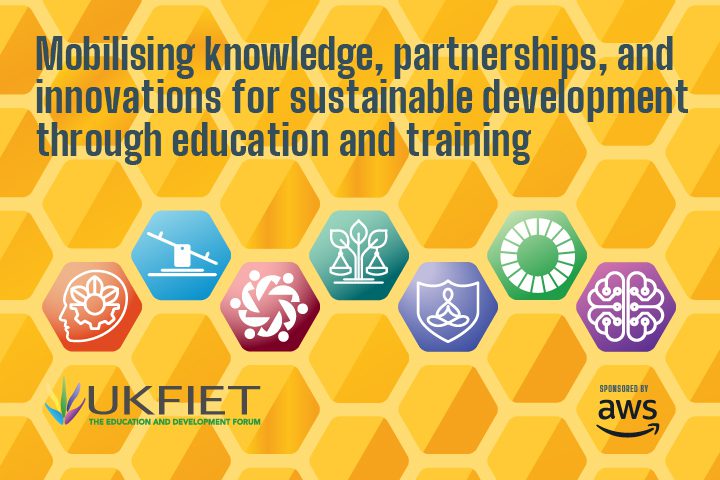Event Highlights: UKFIET 2025
Dates: 16 to 18 September 2025
Location: Oxford, UK
- Relational Ecologies of Knowledge and Practice: a Workshop of the Epistemic Justice Network
- Innovations in Multilingual Education forSustainable Futures
- Funding the Future: How Outcome-Based Financing can Strengthen Education Systems
NORRAG at the UKFIET Conference 2025
NORRAG participated in the UKFIET 2025 conference in Oxford, held under the theme “Mobilising Knowledge, Partnerships, and Innovations for Sustainable Development through Education and Training.” The event convened policymakers, researchers, practitioners, and funders to reflect on the role of education in advancing sustainability, equity, and systemic transformation. Cross-cutting themes included skills for sustainable futures, equitable partnerships, intersectionality, learner wellbeing, and climate and environmental justice.
The NORRAG exhibition on International Cooperation in Education was showcased in the halls, and NORRAG experts contributed to three sessions: “Funding the Future: How Outcome-Based Financing can Strengthen Education Systems”, which examined whether results-based financing can support systemic coherence and long-term sustainability; “Relational Ecologies of Knowledge and Practice: a Workshop of the Epistemic Justice Network (EpiNet)”, which fostered dialogue about more equitable knowledge partnerships and relational models of knowledge production; and “Innovations in Multilingual Education for Sustainable Futures”, showcasing rapid innovations in using learners’ home and community languages in educational settings across continents.
During these sessions, participants engaged deeply with tensions around aligning funding models with local systems, decentering hierarchical knowledge flows, and promoting linguistic justice as integral to equitable education. NORRAG’s facilitation helped bridge theory and practice and underscored the urgency of reframing partnerships, knowledge mobilization, and innovation in service of sustainability, equity, and inclusive education.
Relational Ecologies of Knowledge and Practice: a Workshop of the Epistemic Justice Network
This workshop was proposed by the emergent Epistemic Justice and the Knowledge Commons Network (EpiNet) to advance collaborative research and action for transforming knowledge for the futures of education. EpiNet envisions strengthening an approach favouring relational ‘ecologies of knowledge’ over hierarchical research and partnership arrangements that have dominated knowledge production and exchange in education and research. The workshop is proposed for the Equitable Partnerships sub-theme, actively responding to the call to ‘bravely open up space’ to share ‘critical accounts and reflections on the challenges and barriers to equitable partnerships’.









